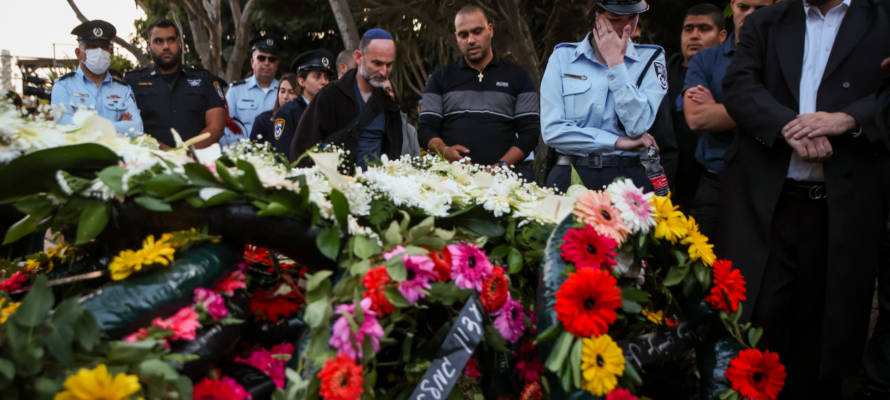Discussing the surge in terror, Associated Press, a global news service with 1,300 clients, ignores Palestinian incitement and rejection of coexistence.
By Gidon Ben-Zvi, Honest Reporting
In a piece titled After Israel attacks, sidelined Palestinian issue reemerges, The Associated Press (AP), a global news service with 1,300 clients, reports:
“Three deadly attacks in Israel in a week are raising questions over Israel’s approach to its conflict with the Palestinians, after years of efforts to sideline the issue and focus instead on other regional priorities.”
AP writer Tia Goldenberg is suggesting that Israel is at least indirectly at fault for the Palestinian terror campaign that has resulted in 11 fatalities in just over a week, reportedly the deadliest wave of violence since 2006.
AP Weaves Fact With Opinion
The piece goes on to note several recent political developments that pertain to the Jewish state: the historic gathering in the Negev Desert, the new Israeli government’s ideological diversity, security measures that were implemented by Jerusalem vis-à-vis Ramallah and the Gaza Strip, and Palestinian Authority President Mahmoud Abbas’ condemnation of Tuesday night’s shooting in the central city of Bnei Brak.
AP proceeds to opine on the cumulative effect of these developments:
“There are no signs that [Israeli prime minister] Bennett is prepared to address the deeper issues fueling the conflict.”
“Israel has long sidelined Abbas, branding him an unacceptable partner for peace talks.”
“Israel has shifted its priorities to containing archenemy Iran and building regional Arab alliances.”
Goldenberg subtly weaves together facts with opinions to imply that Israeli citizens are somehow reaping the whirlwind of their government’s bad decisions and misguided policies.
It is an impression that is belied by reality.
AP Turns Reality into Mere Israeli Allegation
The argument that Israel’s “approach to its conflict with the Palestinians” has in some way acted as a catalyst for the terror wave engulfing the Jewish state is specious. Critically, it ignores how spikes in Palestinian violence immediately before and during Ramadan have long been connected to incitement by Palestinian leaders.
Last year, in the days leading up to the outbreak of the Hamas-initiated conflict, Palestinian incitement fueled violence perpetrated by Muslims at the Al Aqsa Mosque in Jerusalem throughout much of Ramadan.
Indeed, there is almost always an uptick in violence during the Muslim fasting month, with historical data indicating a 200 percent increase in terrorist attacks around the world.
Yet the Associated Press glosses over this salient point, writing that Israel “…blames incitement on Palestinian social media, says that Hamas encourages the violence.”
AP’s failure to provide crucial context is particularly egregious because the article later highlights Abbas’ condemnation of the terror attack in Bnei Barak. This, while omitting the attacker’s likely affiliation with the Al Aqsa Martyrs’ Brigades, the “military wing” of the PA president’s Fatah faction.
AP notes that the Bennett government has tried to quell unrest by easing restrictions on work permits for Palestinians among other measures ahead of Ramadan, which begins this weekend. But by not mentioning Palestinian incitement, readers are given the mistaken impression that such restrictions were the cause of the violence. They were, in fact, a response to it.
AP Disregards Palestinian Rejection of Israeli Peace Offers
To bolster its claim that Israel is uninterested in making peace with the Palestinians, AP also dredges up the debunked apartheid myth:
“Several rights groups have branded Israeli rule between the Jordan River and the Mediterranean Sea as an apartheid system.”
“Omar Shakir of the international group Human Rights Watch stressed that ‘the reality is that it is unsustainable to continue ruling over millions of people deprived of their fundamental rights.’”
Yet, the group cited, Human Rights Watch, is hardly a reputable source given that it has previously used provenly biased research methods to slander Israel as an apartheid state.
Meanwhile, the current Israeli government has made several overtures to Ramallah. In December of last year, Defense Minister Benny Gantz hosted Palestinian Authority President Mahmoud Abbas at the former’s home in Rosh Ha’ayin. It marked the first time the Palestinian leader held talks with a senior Israeli official in Israel since 2010.
The Israeli government subsequently announced that it would implement a series of measures intended to aid the PA and ease Palestinians’ daily life, including providing Ramallah with a NIS 100 million loan ($32.2 million).
This evening I met with PA President, Mahmoud Abbas. We discussed the implementation of economic and civilian measures, and emphasized the importance of deepening security coordination and preventing terror and violence – for the well-being of both Israelis and Palestinians.
— בני גנץ – Benny Gantz (@gantzbe) December 28, 2021
Gantz’s peacemaking efforts are one of several examples over the years of Israel initiating talks with Ramallah in an effort to finally resolve the conflict. And while AP correctly observes that the two-state solution remains elusive, neither the Israeli government’s repeated efforts to jump-start the peace process nor the Palestinian leadership’s incessant intransigence is touched upon.
We call on the Associated Press to amend its piece so as to provide a factual account of the events unfolding in Israel. We encourage you to contact the AP to register your concerns.
